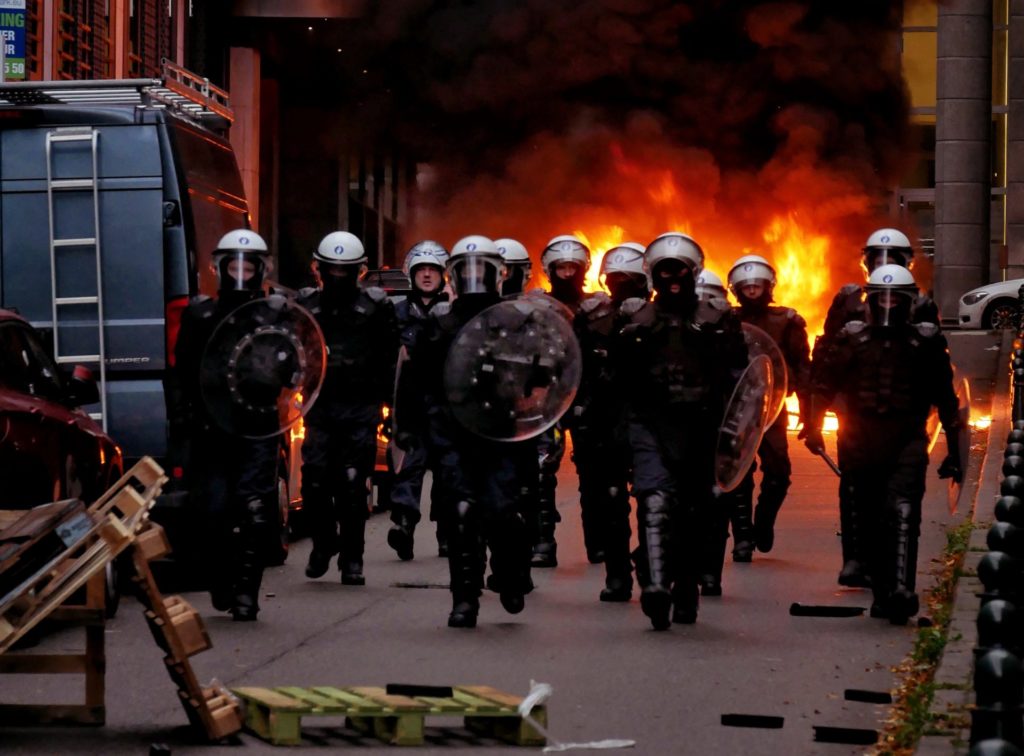Belgium has dropped a place in an annual ranking of civil rights across the world. This follows concerns of a clampdown on media freedom and attacks on certain civil society groups.
The latest report from the CIVICUS Monitor sees Belgium downgraded from "open" – the highest rating a country can receive for its democratic freedoms – to "narrow." This indicates that although individuals and civil society organisations can exercise their rights for peaceful assembly and expression, violations of these rights also occur.
"In Belgium, we have seen a steady decline in the freedom of peaceful assembly. We are concerned about the manner in which authorities have responded to protests, which includes detentions of protesters and the use of excessive force," Aarti Narsee, CIVICUS Monitor's civic space researcher in Europe, told The Brussels Times.
A global trend
The country was downgraded following a thorough assessment of basic democratic freedoms that human rights observers have been collecting over the past three years. These include the freedoms of expression, peaceful assembly and association; CIVICUS says that these are being violated in Belgium.
Several major protests against racial and class injustice have been quelled in the last two years, including the Black Lives Matter protests – which among other things was an action against police brutality – as well as the “Justice for Adil" and the “Justice for Ibrahima” demonstrations, during which police used excessive force and arrested dozens of people, including many minors.
Related News
- Minor arrested during riots after protest in Brussels last weekend
- Anti-Covid protest organisers accuse police of initiating violence at riots
Narsee says that the situation in Belgium reflects a global decline of civic freedoms, a trend observed across Europe where a total of four countries have been downgraded this year: Belgium, Czech Republic, Poland, and Belarus. She highlighted the deteriorating situation in Hungary, where several anti-LGBTQI+ rights laws were passed.
"Despite having the most ‘open’ rated countries, we are seeing a decline in civic freedoms in the region year on year," Narsee said. She added that this has been exacerbated by the coronavirus crisis and measures implemented to curb its spread.
Targetting vulnerable communities
CIVICUS also expressed concern that acts of police brutality often seem to be racially charged, "directed towards those from marginalised and vulnerable communities who have been targeted when protesting for their fundamental rights."
More recently, more than 450 undocumented migrants staged a hunger strike for over 60 days calling for fair regularisation procedures. They reported facing “violent and repressive interventions by law enforcement” during one of their strikes, including the use of tear gas.
Similar concerns over the alleged racist violence and profiling by police in Belgium had been expressed earlier this year by the United Nations Committee for the Elimination of Racial Discrimination (CERD), which said it was a persistent problem and that there was an alarming absence of data on people targeted by police checks.
An investigation by the General Inspectorate found that this lack of data prevents the Belgian police from recognising police violence, discrimination, and racism within its own ranks.
Recommendations to improve
When asked what countries can do to improve their scores, Narsee stressed the importance of protecting the right to peaceful assembly, which she argued is under threat in Europe.
"We call on states like Belgium to desist from using excessive force against peaceful protesters, to stop preempting and preventing protests, to adopt best practices on the freedom of peaceful assembly and ensure any restrictions imposed on assemblies comply with international human rights standards."
Additionally, the organisation urges Belgian authorities to tackle racialised police brutality and what it terms 'colonial policing practices'.
In response to previous allegations of police brutality and systemic racism, Home Affairs minister Annelies Verlinden said earlier this year that reform of Belgium’s disciplinary procedure for the police is being worked on.

